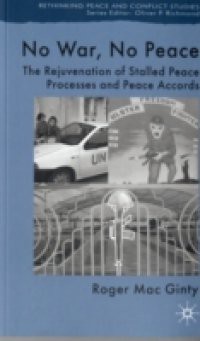Most peace accords reached in civil wars over the past decade have resulted in extremely dysfunctional peace: a grudging and exhausted hiatus in conflict rather than a process that results in sustainable peace and reconciliation between antagonistic groups. Despite the local and international peace-support energy expended in Bosnia, Israel-Palestine, Cambodia, Northern Ireland, Democratic Republic of Congo and elsewhere, the quality of peace experienced by citizens in post-war locations is often appalling. This book adopts a critical perspective to investigate the stalled, tense and fragile peace that often follows orthodox peace processes and peace accords supported by the international community. It identifies the 'liberal democratic peace' as the increasingly standardized version of peace promoted by leading states, international organizations and international financial institutions. Based on extensive observations in societies emerging from civil wars, No War, No Peaceoffers guidance on rejuvenation and reorientation of stalled and dysfunctional peace accords.

